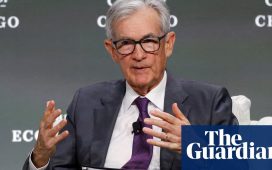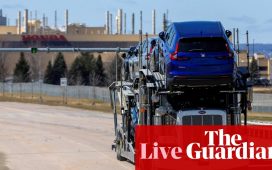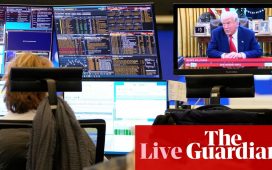Hunt: Mustn’t pump extra money into people’s pockets
UK chancellor Jeremy Hunt has told Bloomberg that it is ‘unlikely’ that he will have more fiscal firepower this autumn, to fund tax cuts or higher spending.
Speaking to Bloomberg TV today, Hunt says he doesn’t expect to have more fiscal headroom to hit his targets than in March, when it was the lowest on record.
That’s because inflation has been stickier than forecast back in the Spring budget, meaning the UK’s debt repayments have been higher than expected.
[Back in spring, Hunt only had £6.5bn of headroom against his main fiscal rule – to ensure that debt is falling as a share of national income between 2026/27 and 2027/28.]
Hunt says today the government’s priority is to bring down inflation, so that will be the focus of the autumn statement in November, rather than to put ‘extra money’ into people’s pockets to help them.
He explains:
When you’re trying to bring down inflation, you have to be really careful not to pump extra money into the economy, much as you would like to.
Not to pump extra money into people’s pockets, because that can push up prices and keep inflation higher for longer.
“When you’re trying to bring down inflation, you have to be really careful not to pump extra money into the economy, much as you would like to”
Chancellor Jeremy Hunt drops some hints at what to expect from the UK government’s upcoming Autumn Statement https://t.co/x6KqlSZThl pic.twitter.com/4qYMXcZg1V
— Bloomberg TV (@BloombergTV) September 11, 2023
It was reported last week that the chancellor is considering real-terms cuts to working benefits in the autumn statement – ie, not raising them in line with inflation.
That would be a severe blow to struggling households, with many low-paid workers reliant on working age benefits to pay for essentials.
Hunt rather swerves a question on whether the Bank of England has done a good job, pointing out that many central banks underestimated how persistent inflation would be.
He says the UK is making progess, with inflation falling from 11% last autumn to 6.8% in July.
Hunt also suggested the UK could agree a trade deal with India by the end of the year, depending how negotiations proceed over the next few weeks.
Key events
Closing summary
Time for a quick recap.
Chancellor Jeremy Hunt has declared that he will not ‘pump extra money’ to help households this autumn, while a Bank of England policymaker has declared interest rates should move even higher to fight inflation.
Hunt told Bloomberg TV that it was “unlikely” that he will have more fiscal headroom in the autumn statement, scheduled for November, than he had in March.
Hunt declared:
“When you’re trying to bring down inflation, you have to be really careful not to pump extra money into the economy, as much as you would like to…
Not to pump extra money into people’s pockets – because that can push up prices and keep inflation higher for longer.”
This will fuel concerns that the chancellor might hit benefits claimants with real terms cuts, to fund pre-election tax cuts.
Households have been warned to expect even higher borrowing costs too. Catherine Mann, a member of the BoE’s Monetary Policy Committee, will argue today that it is better to raise rates higher than needed, rather than risk not doing enough.
Mann says:
I believe it would be prudent to risk an error that can be more easily rectified. Right now, that is to err on the side of tightening further in order to prevent the risks of further inflation persistence from crystalizing.
There’s been celebration in Oxford today, where BMW announced plans to invest £600m to upgrade its Cowley factory to produce next-generation electric minis.
The government has refused to confirm how much financial support it offered (though £75m is rumoured to be the price tag).
The U-turn, which will secure 4,000 jobs at Oxford and Swindon, where BMW makes body panels, was lauded by government ministers, including the chancellor, Jeremy Hunt, who said BMW’s investment was “a huge vote of confidence in this country as a global leader in electric vehicles”.
But it’s been a grim day for workers at Wilko. All of the stricken retailers 400-plus stores are to close with the loss of more than 12,000 jobs after talks with potential buyers failed to deliver a rescue deal.
Nadine Houghton, GMB National Officer, said:
“Wilko was far more than a brand, a retailer or the products it sold, it was the thousands of loyal team members now facing an uncertain future.
“Wilko may have ceased genuinely being a family brand many years ago, but the staff kept the real family ethos of Wilko alive until the very end. It is the family that Wilko colleagues made for themselves that will be missed the most.
“This isn’t a tragedy without cause. Wilko should have thrived in a bargain retail sector that is otherwise strong, but it was run into the ground by the business owners.
The bad news came as the boss of John Lewis has called for a royal commission review into the UK’s ailing high streets.
Too many towns and cities are shells of their former selves. Boarded-up shops left vacant, dwindling numbers of banks and post offices. And in their place, seemingly endless rows of vaping and charity shops. For too many local residents, the heart has been ripped out of their community.
In the economic world, the European Commission has predicted Germany’s GDP will shrink this year. The EC’s new economic forecasts also showed a slower-than-hoped recovery across the eurozone and the EU.
Growth forecast for the 6 largest EU economies for 2023 (%):
🇪🇸 2.2
🇫🇷 1.0
🇮🇹 0.9
🇳🇱 0.5
🇵🇱 0.5
🇩🇪 -0.4🇪🇺 1.4
Summer #ECForecast ↓
— European Commission (@EU_Commission) September 11, 2023
The largest solar farm in Europe to be built on a closed landfill site has begun generating renewable electricity from a former rubbish dump in Essex.
BoE’s Mann: Better to raise interest rates too high than not high enough
A Bank of England policymaker will argue today that it would be better to raise interest ratest too high, rather than not high enough.
Catherine Mann will tell the Canadian Association for Business Economics that she believes it would be prudent to risk an error that can be more easily rectified.
She says that it would be better to “err on the side of tightening further in order to prevent the risks of further inflation persistence from crystalizing.”
In a speech just released, Mann argues:
If I am wrong, and there are excess negative effects to the real economy, it is an easier task to rectify as compared to regaining control over inflation.
She then warns that leaving UK interest rates at their current level of 5.25% would risk letting inflation running too high, requiring tougher action to bring price pressures down.

In a clear hint that Mann would push for another rate rise at the Bank’s meeting next month, she says:
In my view, holding rates constant at the current level risks enabling further inflation persistence which will have to be unwound eventually with a worse trade-off.
If we underestimate the rise in the persistent component of inflation and set policy consistent with a world that may no longer exist we will ourselves contribute to the persistent overshoot of the target. And the longer this overshoot is allowed to continue, the more likely a departure from the old ‘low inflation, low volatility’ steady state.
Mann is known at one of the more hawkish members of the Bank’s Monetary Policy Committee.
And today she also pushed back against calls for the Bank to ease off on bringing inflation all the way down to 2%, down from 6.8% in July.
It’s a risky bet that inflation expectations are sufficiently well-anchored and to wait for core inflation to ease down, as this extends the duration way above the target-consistent rate. We need to prepare for a world where inflation is more likely to be volatile in the future, and the neutral nominal rate is likely to be higher than in the past.
While these might support a “3% inflation is close enough”, popular in some circles, it cannot be our guide. We need to communicate and act on our commitment to do what is necessary to achieve the 2% target, sooner rather than later.
In the aerospace world, US aerospace and defence group RTX Corp has announced it expects to take a $3bn hit from problems with its Pratt & Whitney engines fitted to Airbus jets.
RTX says it expects to remove between 600 to 700 engines for ‘shop visits’ between 2023 and 2026, to remedy a problem involving contaminated powder metal discovered in July.
These engine removals will lead to “higher aircraft on ground”, RTX says, rather than being able to fly.
Wizz Air, the low-cost airline, has told shareholders this afternoon that it is currently assessing the imllications, but believes its capacity could be cut by 10% in the second half of the financial year.
Jeremy Hunt also touched on the UK’s espionage row with China, saying Britain takes any attempt to subvert its democratic processes “very seriously”.
It emerged on Sunday that a parliamentary researcher with links to senior Conservatives and potential access to sensitive information had been arrested over allegations of spying for China. He has insisted he is “completely innocent”.
Speaking to Bloomberg TV during a visit to Delhi, the chancellor said the government is “very confident that we will be able to keep the fabric and the functioning of our democracy secure.”
He added that “we do not expect other countries to try and interfere with it,” and argued that the UK needs to keep speaking to Beijing.
“Diplomacy is about talking to everyone, and Britain will always understand that.
And of course when you have that dialog, you are able to talk about the things that you disagree about.”
Chancellor Jeremy Hunt says the UK takes any attempt to subvert its democratic processes “very seriously,” but spying allegations underscore the need for dialog with Beijing https://t.co/7r1N9LSKJh
— Bloomberg (@business) September 11, 2023
Rishi Sunak’s spokesperson refused to say today if the UK had raised the alleged spying case with China before last weekend (when the PM met with Chinese Premier Li Qiang during the G20 meeting).
Hunt: Mustn’t pump extra money into people’s pockets
UK chancellor Jeremy Hunt has told Bloomberg that it is ‘unlikely’ that he will have more fiscal firepower this autumn, to fund tax cuts or higher spending.
Speaking to Bloomberg TV today, Hunt says he doesn’t expect to have more fiscal headroom to hit his targets than in March, when it was the lowest on record.
That’s because inflation has been stickier than forecast back in the Spring budget, meaning the UK’s debt repayments have been higher than expected.
[Back in spring, Hunt only had £6.5bn of headroom against his main fiscal rule – to ensure that debt is falling as a share of national income between 2026/27 and 2027/28.]
Hunt says today the government’s priority is to bring down inflation, so that will be the focus of the autumn statement in November, rather than to put ‘extra money’ into people’s pockets to help them.
He explains:
When you’re trying to bring down inflation, you have to be really careful not to pump extra money into the economy, much as you would like to.
Not to pump extra money into people’s pockets, because that can push up prices and keep inflation higher for longer.
“When you’re trying to bring down inflation, you have to be really careful not to pump extra money into the economy, much as you would like to”
Chancellor Jeremy Hunt drops some hints at what to expect from the UK government’s upcoming Autumn Statement https://t.co/x6KqlSZThl pic.twitter.com/4qYMXcZg1V
— Bloomberg TV (@BloombergTV) September 11, 2023
It was reported last week that the chancellor is considering real-terms cuts to working benefits in the autumn statement – ie, not raising them in line with inflation.
That would be a severe blow to struggling households, with many low-paid workers reliant on working age benefits to pay for essentials.
Hunt rather swerves a question on whether the Bank of England has done a good job, pointing out that many central banks underestimated how persistent inflation would be.
He says the UK is making progess, with inflation falling from 11% last autumn to 6.8% in July.
Hunt also suggested the UK could agree a trade deal with India by the end of the year, depending how negotiations proceed over the next few weeks.
GMB: redundancy now likely for all 12,500 Wilko workers.
The GMB union fears that all 12,500 Wilko staff now face redundancy.
That follows this morning’s news that all Wilko stores are set to close by early October, after the rescue deal proposed by the owner of HMV collapsed.
Nadine Houghton, GMB National Officer, said:
“Wilko was far more than a brand, a retailer or the products it sold, it was the thousands of loyal team members now facing an uncertain future.
“Wilko may have ceased genuinely being a family brand many years ago, but the staff kept the real family ethos of Wilko alive until the very end. It is the family that Wilko colleagues made for themselves that will be missed the most.
“This isn’t a tragedy without cause. Wilko should have thrived in a bargain retail sector that is otherwise strong, but it was run into the ground by the business owners.
“Money was siphoned out of the business for dividends, warnings about what needed to be done to save the business were not heeded and advice around what the business to do to thrive was not listened to.
“No worker caused the downfall of Wilko. But they will be the ones who will suffer – all as the owners get off scot-free. GMB will not stop campaigning for the owners of this debacle to be held to account.”

Jonathan Reynolds MP, Labour’s Shadow Business Secretary, has responded to today’s sad news that all Wilko stores are due to close:
“This is heartbreaking news for staff and their families who have been holding out hope of a deal that would protect their jobs.
Sadly, shuttered up shops have become the norm under the Conservatives who have weakened the foundations of our economy with local high streets paying the price.
Labour will take the action needed to revive the great British high street reforming business rates, cracking down on anti-social behaviour and putting an end to empty premises to bring shoppers back to their high street.”
https://www.theguardian.com/business/2023/sep/11/wilko-shops-doug-putman-bid-collapses-hmv-owner

Mark Sweney
Very bad retail news: All of Wilko’s 400-plus stores are to close with the loss of more than 12,000 jobs, after talks with potential buyers failed to deliver a rescue deal for the stricken retailer.
The GMB union said on Monday that the administrators, PwC, had informed staff that all of the chain’s 408 stores are set to close by early October.
This blow comes after the rescue deal proposed by the owner of HMV, which would have saved about half of Wilko’s stores and secured the future of thousands of jobs, collapsed this morning.
Kemi Badenoch has declined to confirm reports that the UK government is providing £75m of funding to BMW to encourage today’s investment at the Oxford plant.
She told reporters in Oxford:
“I won’t comment on the figure because that creates difficulties in future negotiations.
“What I will say is that we do provide some subsidy, very light subsidy, in the auto industry because it faces so much difficulty, and some of that is regulatory.
“So if we’re asking manufacturers to transition to net zero, that creates additional costs which make it a little bit harder so we do have to factor that in.
Kemi Badenoch also pointed to the ‘many headwinds’ which have hit the UK car industry, speaking at Mini’s Oxford plant today, saying:
“The difficulties with supply chains post-Covid, increased energy costs because of Russia’s invasion of Ukraine, the net zero transition which has been putting, we recognise, a lot of pressure on the auto industry.
“But you are meeting and in fact exceeding the expectations just as we see this morning.
“So I wanted to say thank you for that.”
As flagged earlier (see 8.05am), the car industry fears the new Brexit ‘rules of origin’ requirements will be another disruptive, costly headwind.
Business Secretary Kemi Badenoch told staff at BMW’s plant this morning:
“We want auto manufacturing not just stay in the UK but to be the best in the world.
“This is a part of that story.
“We want you to have great jobs, well-paid jobs, that last for a very long time.
“It doesn’t just happen. We all have to work together and think about it very carefully and make sure that we get it just right.
“If we do too much it goes wrong, if we do too little it goes wrong.”
Local councillers are cheering BMW’s plans to invest £600 million in Mini Plant Oxford:
Oxfordshire County Council leader Liz Leffman says:
“This is fantastic news for BMW Cowley, for the thousands of people who work at the MINI plant, for Oxfordshire’s economy, and for the fight against climate change.
“An investment of this scale shows the faith being placed in Oxford to produce the latest all-electric, emission-free models of this iconic car which is synonymous with the city.
“The future of motoring is electric, and the future of MINI manufacturing is here in Cowley, where it began in 1959. Oxford has a long and proud history of car production, and this investment will see it continue for many years to come, producing cleaner, greener cars which won’t pollute our streets or contribute to climate change by burning fossil fuels.
“It demonstrates what an incredible location Oxfordshire is for those wanting to invest in state-of-the-art manufacturing, and how vital it is to move towards sustainable technology.
“BMW’s role at the heart of the Oxford for more than 20 years has helped the whole county’s economy thrive, and we are grateful that this relationship is going to continue and flourish.
“As the sign outside the Cowley plant proudly proclaims, Oxford is ‘the home of MINI’. Long may that continue.”
Councillor Susan Brown, Leader of Oxford City Council, says the investment will secure thousands of green jobs for local people, protecting the livelihood of many Oxford families.
Brown adds:
It will strengthen Oxford’s position as a key player in the global electric vehicle industry, benefitting small businesses in our area.
“MINI Plant Oxford is an integral part of Oxford’s history, economy and identity. The plant has been at the heart of our city’s communities and industry for over a century, and we look forward to working with BMW and others to help ensure it stays that way for generations to come, starting with the planning.”

Trade Secretary Kemi Badenoch speaking at the BMW Mini plant at Cowley in Oxford Photograph: Joe Giddens/PA
Business and Trade Secretary Kemi Badenoch has travelled to Oxford for today’s announcement at the Cowley car plant, just outside the Oxford ring road.
Badenoch says:
“This decision is a big vote of confidence in the UK economy and the work of this Government to ensure the continued strength of our world-leading automotive sector.
We are proud to be able to support BMW Group’s investment, which will secure high-quality jobs, strengthen our supply chains and boost Britain’s economic growth.”
Mini Plant Oxford can trace its history back to 1912, when manufacturing pioneer William Morris (later Viscount Nuffield) began making his first car, the “bullnose” Morris, at the site (he’d previously assembled and repaired bicycles, and then moved onto motorbikes).


BMW announces £600m investment for all-electric MINI production in the UK.
Newsflash: BMW has confirmed “a new investment of more than £600m” at its Mini factories at Oxford and Swindon.
BMW says the move, “supported by the UK Government”, will help to secure jobs at the Oxford manufacturing plant and at the body-pressing facility in Swindon.
Milan Nedeljković, BMW’s board member responsible for production, says:
“With this new investment we will develop the Oxford plant for production of the new generation of electric MINIs and set the path for purely electric car manufacturing in the future.”
From 2026, the Oxford plant will build two new all-electric Mini models – the MINI Cooper 3-door and the compact crossover MINI Aceman. By 2030 production volume will be exclusively electric.
Oxford currently makes the existing Mini Electric, as well as the 3-door, 5-door and Clubman versions of the classic UK car.
Stefanie Wurst, Head of the Mini brand, says,
“Mini has always been aware of its history – Oxford is and remains the heart of the brand. I am delighted that the two new, fully electric MINI models – the MINI Cooper and MINI Aceman – are also being produced in Oxford, thereby confirming our path to a fully electric future.
The continuing high demand for our locally emission-free vehicles shows the openness of the global MINI community to electromobility, which we will be able to serve optimally, also thanks to Oxford”.
Financial incentives and a commitment to a Zero Emission Vehicle Mandate policy have helped the UK government win the race to secure electric mini production in Oxford, says Colin Walker, head of transport at the Energy & Climate Intelligence Unit (ECIU), said.
The ZEV Mandate introduces ZEV targets that will require an increasing percentage of a manufacturer’s annual new car and van sales in the UK to be zero emission until reaching 100% in 2035.
Walker explains:
Having stuck to its guns on the mandate, the car industry now urgently wants the detail from Government. This would entrench the UK’s reputation as a stable and attractive place in which to invest in EV manufacturing. This shouldn’t be a hard task given that UK EV sales figures are already surging.
“Following the JLR battery factory commitment earlier in the year, this is good news for the future of the car industry. But more will be needed if the UK isn’t going to see its car industry return to rust again. 80% of the cars built in the UK are exported. Over 70% of these go to markets – the UK, 16 US states and China – that have committed to moving to electric vehicles. If the UK’s car industry doesn’t change to produce the EVs needed to meet that demand, it could find itself losing over £13bn a year in export revenue by 2030.”









